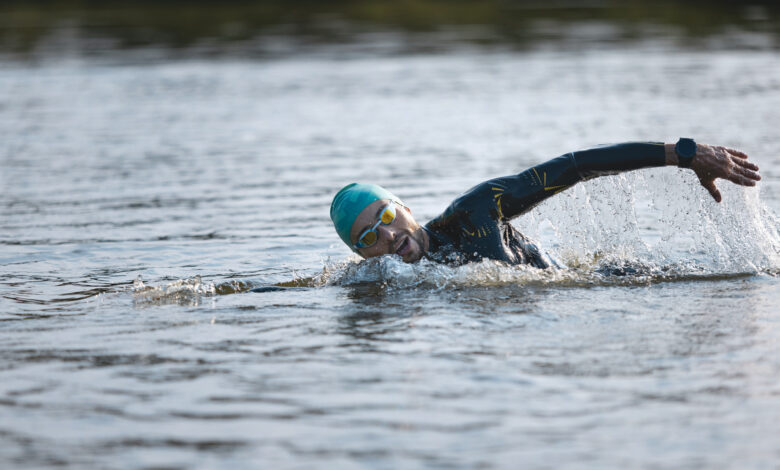Unlocking the Allure of Open Water Swimming: Dive into a World of Adventure and Fitness

Open water swimming, with its sense of freedom and connection to nature, has become a popular aquatic activity for those seeking a break from the monotony of the pool or the confinement of lanes. It’s a thrilling way to explore the vastness of lakes, rivers, and oceans while enjoying the numerous physical and mental health benefits that swimming offers. In this article, we’ll dive into the world of open water swimming, exploring its appeal, the benefits it offers, essential safety considerations, and how to get started as per Swimzer.
The Allure of Open Water Swimming
Open water swimming captivates individuals for a variety of reasons, offering unique experiences and sensations:
- Nature’s Embrace: Unlike the controlled environment of a pool, open water swimming immerses you in the natural world. Whether it’s the tranquility of a mountain lake or the rhythmic ebb and flow of the ocean, nature becomes your backdrop.
- Adventure and Exploration: Open water swimming encourages exploration. As you glide through open waters, you can discover new places, hidden coves, and breathtaking landscapes, often inaccessible by other means.
- Physical Challenge: The dynamic conditions of open water, including currents, waves, and temperature fluctuations, create a challenging workout. It engages a broader range of muscle groups, enhancing your fitness levels.
- Mental Resilience: Open water swimming can be mentally demanding, requiring focus, adaptability, and courage. Conquering the uncertainties of nature builds mental resilience and boosts self-confidence.
- Community and Camaraderie: Open water swimming communities are tight-knit and welcoming. Participating in events or group swims can lead to lasting friendships and shared passion.
Health Benefits of Open Water Swimming
Beyond the adventure and thrill, open water swimming offers a multitude of health benefits:
- Cardiovascular Fitness: The continuous movement in open water provides an excellent cardiovascular workout, strengthening your heart and improving circulation.
- Muscle Strength and Endurance: Open water swimming engages both upper and lower body muscles, building strength and endurance.
- Weight Management: Swimming in open water burns a significant number of calories, making it an effective tool for weight management.
- Stress Reduction: Immersing yourself in natural surroundings and rhythmic swimming strokes can have a calming effect, reducing stress and anxiety.
- Improved Sleep: Regular open water swimming can promote better sleep patterns, helping you enjoy restful nights.
- Mental Clarity: The combination of physical activity and immersion in nature can boost mental clarity and creativity.
Safety Considerations for Open Water Swimming
While open water swimming is an exhilarating pursuit, it’s essential to prioritize safety. Here are some key safety considerations:
- Know Your Limits: Assess your swimming skills honestly and be aware of your limits. Open water conditions can change rapidly, so ensure you’re adequately prepared.
- Swim with Others: Whenever possible, swim with a buddy or in a group. This provides safety through numbers and assistance if needed.
- Learn About the Environment: Understand the specific challenges of the open water environment you plan to swim in, including tides, currents, and water temperature.
- Wear Bright Colors: Wearing brightly colored swim caps and swimwear makes you more visible to boaters and other swimmers.
- Check the Weather: Always check the weather forecast before heading out for an open water swim. Avoid swimming in severe weather conditions.
- Use Safety Gear: Depending on your location, consider using safety gear such as a tow float or a safety buoy with a whistle. These devices make you more visible and provide flotation if needed.
- Stay Hydrated: Even in the water, it’s essential to stay hydrated. Dehydration can occur due to exertion and temperature changes.
- Practice Sightings: In open water, you can easily lose your sense of direction. Practice “sightings” by lifting your head slightly to check your position and ensure you’re swimming in the right direction.
Getting Started with Open Water Swimming
If you’re eager to start your open water swimming journey, here are some steps to guide you:
- Choose Your Location: Research and select a suitable open water location based on your skill level. Lakes, rivers, and sheltered coves are ideal for beginners.
- Gear Up: Invest in quality swim gear, including a wetsuit if swimming in cold water, a bright swim cap, goggles, and possibly a safety buoy.
- Training: Gradually build your open water swimming skills by starting with shorter swims and gradually increasing the distance. Consider joining a local open water swim group for support and guidance.
- Safety First: Prioritize safety at all times. Share your swim plans with a friend or family member, and check local conditions and safety guidelines.
- Enjoy the Experience: Embrace the experience of open water swimming. Revel in the feeling of the water, the sights and sounds of nature, and the sense of accomplishment as you conquer new challenges.
Conclusion
Open water swimming offers a unique blend of adventure, fitness, and connection to nature. It’s a sport that engages both the body and the mind, providing numerous physical and mental health benefits. While it comes with its own set of challenges and safety considerations, the rewards of open water swimming are well worth the effort. Whether you’re a seasoned swimmer looking for a new thrill or a novice seeking a refreshing escape, open water swimming can be a transformative and deeply rewarding experience. Dive in, explore, and let the open waters awaken your sense of adventure and well-being.



